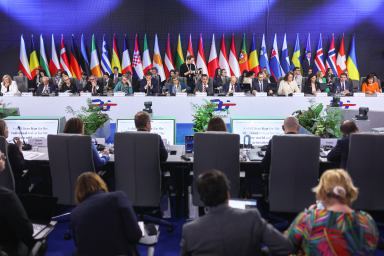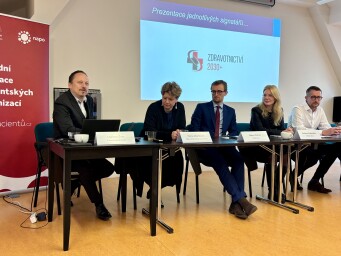Although many Czechs are sports fans, we have big reserves in active exercising and healthy lifestyle. Athletes who can reach out to younger generations and convey the principles of a healthy lifestyle could help combat this. The importance of sport and the role of athletes in the promotion of prevention was the focus of the third annual international conference of the Healthcare Daily “The Economics of Prevention”, which was also attended by sport elites such as the Nagano Olympic champion hockey goalkeeper Dominik Hašek, the goalkeeper of the Czech national football team Tomáš Vaclík and the climber and multiple world champion Adam Ondra.
„It’s important to educate all people, not just the young population – I’m a father myself, and if a little one says she wants to go somewhere but I forbid it, she won’t go. So it’s also about parents being motivated to go out with their children and to set an example for them in prevention and the joy of exercise. We also need to open up sports facilities. Recently, they have been built or reconstructed on the initiative of the athletes themselves. So the problem may be that somewhere children do not have a place to play sports. And we need to find a way to get this to the target group where influencers, athletes and famous personalities could help. They could be the facilitators and the faces of prevention. Not only me, but also colleagues who have children themselves, we all want them to play sports and for public health to improve, so we would be open to these activities,“ says Tomáš Vaclík, goalkeeper of the Czech national football team and the American club New England Revolution.

It should be said at this point that awareness campaigns in the field of prevention have limited effectiveness, but promotion by familiar faces is an exception. „Awareness campaigns are proving to be one of the least effective interventions in impacting populations – unless good influencers do it. If it will look like it has in the past, it’s a dysfunctional model,“ points out Ivan Dushkov, General Health Insurance Company’s deputy for client services.
Government-backed campaigns should be run by experts
The Czech Republic and Slovakia have a number of prevention strategies, concepts and plans, but their impact is usually not what it could be. The fundamental problem is how to communicate them to the general public.
„The crucial thing is to reach out to citizens and youth to get them involved in the programmes. The challenge is to get the government behind them, to fund the programmes in a way that the goals can be achieved, and most importantly, to communicate well towards the people. They must be reached by the campaign. At the same time, familiar faces can change the minds of young people so that they will even consider what is written in the national programme. They don’t listen to how individual factors are detrimental to health because they think it doesn’t affect them – they feel healthy and have other problems and interests. However, when politicians, but also well-known personalities, such as sports and cultural leaders, take a stand, it is possible to reach young people through various social networks and apps. The success of national programmes and action plans, be it on tobacco, alcohol, diabetes, etc., depends on how they are presented and communicated,“ says Ján Mikas, Slovakia’s chief hygienist.

Barbora Macková, the head of the National Institute of Public Health, says that in the Czech Republic we have had political support for prevention in recent years, but that joint communication is sometimes lacking – as can be seen, for example, in a campaign by the Agrarian Chamber of the Czech Republic, supported by the Agriculture Ministry, called “I Eat Meat”, which contained information that was not based on scientific evidence.
„We should all advocate – and here is the coordinating and linking role of the National Institute of Public Health – that a healthy lifestyle is not something abnormal, on the contrary, it should be something that is sexy. We have a long-standing collaboration with most ministries, and it would be nice if this was also true of communication campaigns, where we have a gap and where there hasn’t been much collaboration. We need to know about each other and share experiences. Such campaigns should also undergo professional correction before they go out into the world to the people,“ Macková outlines.
Combating stress with sport
According to Macková, communication of the topic to the public should come from higher levels, ideally at the government level. Public health is a trans-ministerial topic, because it concerns not only the Ministry of Health but also the Ministry of Education, the Ministry of Labour and Social Affairs and the Ministry of Agriculture. The intention is to create a government council for public health, which could ideally be in charge of communication. The chief Slovak health inspector also agrees.

„The media field is so specific now that it has to be done by experts who are dedicated to it – not just a spokesperson or someone who handles information in the media department. It has to be a specialist team that can prioritise, i.e. who to engage, who is targeted for what information, what social media and influencers to use. Today, you can find the information you want on the Internet. The problem is to choose the relevant and important ones. Something like this could be under the auspices of the government, and this official, valid information should have the right communication campaign so that the selected people are reached in an appropriate way,“ underlines Ján Mikas.

When people talk about risk factors today, they most often talk about smoking, alcohol or unhealthy foods that we should limit. However, there is another risk factor that is less often emphasised, which can be combated with a positive approach. „Another risk factor is the stress that is around us. It can’t be measured, but it can be treated – and it can be treated through sport. Physical activity can reduce the stress load,“ concludes Luboš Petruželka, chairman of the Oncology Clinic at the 1st Medical Faculty of Charles University and the General University Hospital in Prague.



Michaela Koubová
Photo by Radek Čepelák
Mohlo by vás zajímat
We would like to thank the General Health Insurance Company, National Sports Agency, RBP, Health Insurance Company of the Ministry of Interior of the Czech Republic, Military Health Insurance Company, EUC Medical Group and Sprinx for their support of the conference.







